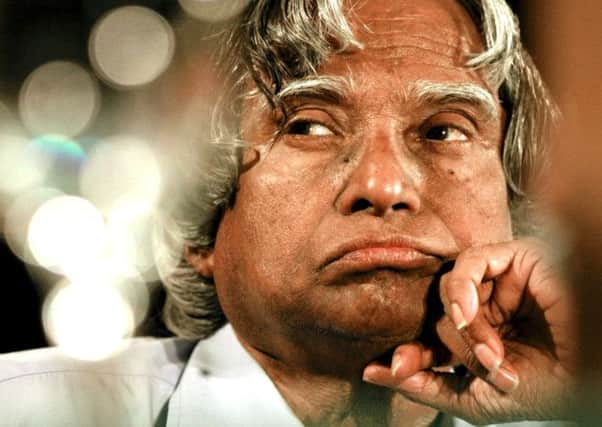Andrew Wilson: forward thinking national leaders


EDINBURGH is a city with a population less than half a million sitting on a line of latitude as far north as Moscow.
There are more than 335 cities in the world with in excess of double its population. But for a host of reasons I need not rehearse here, this small capital of Scotland punches well beyond its weight.
Advertisement
Hide AdAdvertisement
Hide AdThis week a former and current world leader of note both arrived in the city to speak. The latter got massive coverage, the former barely a mention. Whenever any global figure passes through our small corner of the world, we should turn our eyes and ears towards them. If travel broadens the mind, travellers visiting is the next best thing.
The former leader was Dr A P J Abdul Kalam, the 11th president of the world’s largest democracy, India. Receiving his honorary degree from Edinburgh University, his message merits reflection in countries everywhere, not just his own.
The new leader of India, which went to the polls last week, “must have a solid vision for the country and be able to think 20 years ahead of his time”. They should, he added “have the courage to take difficult decisions, tread into unexplored areas for the overall development of the country, manage success and failure with equal ease, and be capable of working with integrity”.
He concluded: “India needs a creative leadership which is the most important component for attaining success in all missions.”
For “India” read every nation on earth. Now more than ever. In a week when Kalam’s visit went largely unreported huge attention focused, understandably, on the two-day visit of the leader of one the oldest and greatest democracies edging inexorably towards a great era of reform.
UK Prime Minister David Cameron cut quite a dash, adding his own not inconsiderable political weight and leadership to the campaign to conserve the status quo.
I am weak, I know, but I have to admit to rather liking and admiring the human being that is David Cameron. There are a host of reasons for this. On the one occasion I met him he struck me as clever and charming. So what, you might say, lots of people are.
But his travails raising a severely handicapped son and coping with his early passing touched me. Hard for anyone, very hard. But acute in someone whose family life is so subject to the public’s gaze.
Advertisement
Hide AdAdvertisement
Hide AdI know his means as a relatively wealthy son of inherited privilege meant that coping wasn’t as materially tough as it is for many families. But no one should ever diminish how hard it must have been, and still is, for him and his wife Samantha.
I prefer to focus on the content of what he does and says rather than the content of his upbringing. I really don’t like the “posh boys” stuff and feel awfully uneasy when we bring this element of anyone’s story into the foreground. Being “posh” and still giving your life to public service rather than private gain is to be admired rather than belittled.
The real issue for any person seeking to lead is what they stand for and do. And on that, Cameron’s core message to Scotland appeared to be “vote No for more powers”. And if we focus on this it doesn’t take us too long to find it wanting.
The Tories have led five governments since last telling us this at the referendum in 1979. And on each occasion they have manifestly failed to deliver. If Scotland buys it again it will almost deserve the outcome that follows.
In fact, had the Conservatives and the wider British policy establishment managed to do what India’s Kalam intoned and think “20 years ahead of their time” we would probably not be having the referendum at all.
The stance of London’s political establishment to the process of home rule has been one of reluctance and lip service dressed up as reform. Even the 1999 breakthrough gave us a parliament controlling the exact same policy power as the Scottish secretary already had with the sole addition of a tax power designed to be unusable and that has gone unused.
The Labour Party’s own risible devolution next steps are a further case in point. Maybe it will be different from the Tories, whose Strathclyde Commission package is yet to be unveiled. But I wouldn’t encourage anyone to hold their breath too long.
Because if the London parties truly believed in extending the logic of home rule, surely they would have done it with purpose and vision long before the weeks before an independence vote?
Advertisement
Hide AdAdvertisement
Hide AdMaybe the ancient wisdom of India that found its way into former President Kalam’s words this week should be allowed to permeate way beyond the narrow confines of the university ceremony that heard them.
Now more than ever, the countries of the world, large and small, need creative leaders with vision willing to tread into unexplored areas and think many decades ahead, not just as far as their next electoral test. «
Twitter: @AndrewWilsonAJW